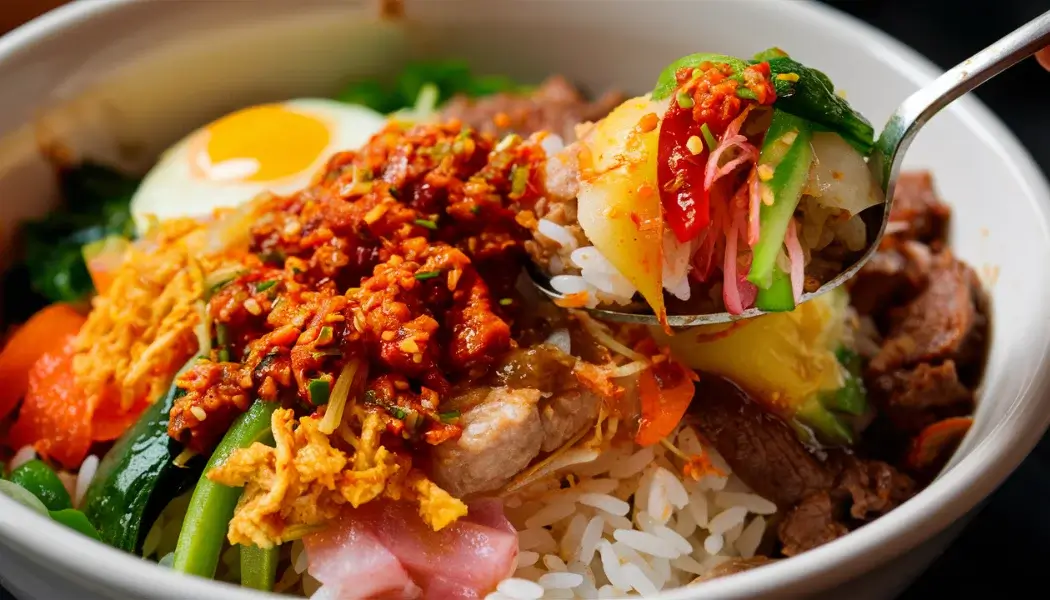A Korean Bibimbap Bowl is a vibrant and satisfying dish that brings together a medley of flavors, textures, and colors in one bowl. This classic Korean meal features rice topped with an array of seasoned vegetables, protein, and a flavorful gochujang sauce, all mixed together just before eating. It’s a versatile and nutritious option perfect for lunch or dinner.
What Makes a Korean Bibimbap Bowl Great
- Flavorful and Diverse: The combination of various seasoned vegetables, marinated protein, and spicy-sweet gochujang sauce creates a delicious and complex flavor profile.
- Nutrient-Rich: Packed with protein, fiber, and vitamins, this bowl offers a balanced and wholesome meal.
- Customizable: Easily adaptable to fit any dietary preference, whether you’re vegetarian, vegan, or a meat lover.
- Visually Stunning: The vibrant colors of the different ingredients make it a feast for the eyes as well as the palate.
Components of a Korean Bibimbap Bowl
- Rice: A base of steamed white rice or brown rice provides a neutral backdrop for the bold flavors.
- Protein: Options include bulgogi (marinated beef), chicken, tofu, or a fried egg for a vegetarian alternative.
- Vegetables: Common choices are sautéed spinach, carrots, bean sprouts, zucchini, and mushrooms, each seasoned individually.
- Extras: Kimchi, pickled radishes, and sesame seeds add additional layers of flavor and texture.
- Sauce: Gochujang (Korean chili paste) mixed with sesame oil, soy sauce, and a touch of sugar creates a spicy-sweet sauce that ties everything together.
How to Make a Korean Bibimbap Bowl
- Prepare the Rice: Cook rice according to package instructions. Keep warm and set aside.
- Cook the Protein: Marinate your choice of protein (beef, chicken, or tofu) in a mixture of soy sauce, sesame oil, garlic, and sugar. Grill or pan-fry until fully cooked. If using a fried egg, cook to your desired doneness.
- Prepare the Vegetables: Julienne or thinly slice the vegetables. Sauté each vegetable separately in a bit of sesame oil until tender, seasoning with salt and a touch of soy sauce.
- Make the Sauce: In a small bowl, mix gochujang, sesame oil, soy sauce, and sugar until well combined.
- Assemble the Bowl: Start with a base of rice in a bowl. Arrange the cooked protein and vegetables on top of the rice in sections, creating a colorful display.
- Add the Extras: Top with kimchi, pickled radishes, and sesame seeds.
- Add the Sauce: Drizzle the gochujang sauce over the bowl. Serve with additional sauce on the side for extra heat.
Tips for a Perfect Korean Bibimbap Bowl
- Fresh Ingredients: Use fresh, high-quality vegetables for the best flavor and texture.
- Balance the Flavors: Ensure each component is well-seasoned to create a balanced dish.
- Customize Your Bowl: Feel free to add or substitute vegetables and proteins according to your preference.

Ingredients
Method
- Prepare the rice according to package instructions or using a rice cooker.
- Spinach: Blanch the spinach in boiling water for 30 seconds, then drain and rinse with cold water. Squeeze out excess water and mix with a little sesame oil, soy sauce, and minced garlic.
- Bean Sprouts: Blanch the bean sprouts for 1-2 minutes, then drain and mix with a little sesame oil and salt.
- Carrots and Zucchini: Sauté the carrots and zucchini separately in a little sesame oil until tender. Season with a pinch of salt.
- Mushrooms: Sauté the shiitake mushrooms with a little sesame oil, soy sauce, and minced garlic until tender.
- In a pan, heat sesame oil over medium heat. Add the ground beef and cook until browned.
- Add soy sauce, minced garlic, sugar, and black pepper. Cook for another 2-3 minutes until the beef is fully cooked and seasoned.
- In a small bowl, mix together the gochujang, sesame oil, sugar, water, vinegar, and minced garlic until smooth.
- Fry the eggs in a pan until the whites are set but the yolks are still runny.
- Divide the cooked rice among bowls.
- Arrange the spinach, bean sprouts, carrots, zucchini, and mushrooms on top of the rice in sections.
- Add a portion of cooked beef to each bowl.
- Place a fried egg on top of each bowl.
- Drizzle with the gochujang sauce.
- Garnish with sesame seeds, chopped green onions, and nori strips.
Notes
Why You’ll Love Korean Bibimbap Bowls
Korean Bibimbap Bowls are loved for their diverse flavors and textures, providing a satisfying and nutritious meal. They are perfect for anyone who enjoys a bit of spice and a lot of variety in their food. Whether you’re making them for a family dinner, a casual get-together, or meal prepping for the week, these bowls are sure to become a favorite.
Ready to Enjoy?
Next time you’re craving a meal that’s both hearty and healthy, try a Korean Bibimbap Bowl. With its mix of seasoned vegetables, savory proteins, and spicy-sweet gochujang sauce, it’s a dish that offers both convenience and deliciousness. Treat yourself to this vibrant and flavorful bowl and enjoy a true taste of Korea!